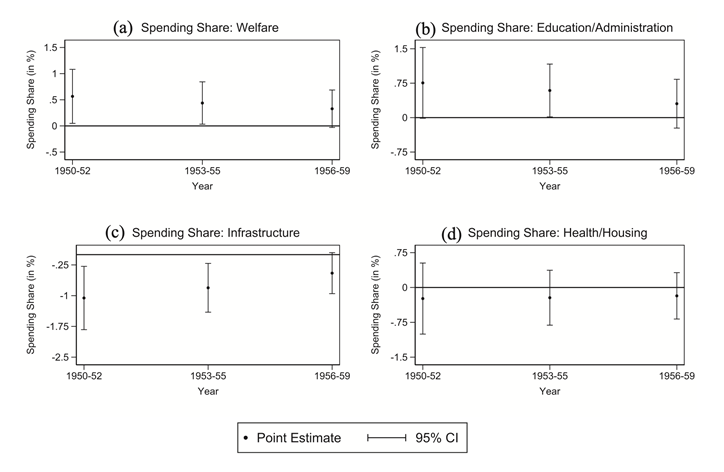The paper by Arnaud Chevalier shows that cities with high inflows of forced migrants increased spending on welfare and education, decreased spending on infrastructure, raised local taxes, and incurred more debt.
This paper by Arnaud Chevalier and co-authors was recently published in the Journal the European Economic Association. It studies the effect of forced migration on public policy setting in the migrant-receiving country.
In the aftermath of World War II, more than twelve million Germans were expelled from Central and Eastern Europe. The paper analyses how the subsequent inflow of eight million people into West Germany affected local taxation and spending decisions. They exploit substantial variation in the county-level population share of expellees across West Germany, ranging between 2% and 44%.
Identifying the causal effect of forced migration on any outcome of interest is challenging because the initial inflow of the expellees across West Germany was unlikely random. To identify a causal effect, the authors pursue an instrumental variable strategy based on push factors that are independent of local conditions across West Germany.
They show that cities responded to the expellee inflow by shifting to more redistributive policies. Cities with large inflows changed their spending priorities. They significantly increased their spending share on welfare and education, while decreasing relative spending on infrastructure.

On the revenue side, they find that cities with a higher share of expellees raised local taxes and incurred more debt than cities with a lower inflow, even if high-inflow cities received more transfers from the federal and state governments.
Survey data from 1953 suggest that the expellees expressed greater political interest, showed greater political participation, and a greater intention to vote than the incumbent population. Results from federal and local elections further show that cities with a greater expellee share voted more for parties that explicitly campaigned for public policies that were closely aligned with the needs of the expellees.
Their central contribution to the existing literature is to show that forced migration can lead to profound and persistent policy changes in the receiving regions. We demonstrate that cities with high inflows shifted their spending priorities toward welfare and education, and selectively raised local taxes. These results suggest that local governments need to react to the inflow of migrants, and thereby implement policy changes that affect all citizens, not just the migrants. At the same time, if the migrants have voting rights they may directly or indirectly influence the political process, possibly also to the detriment of the incumbent population.


